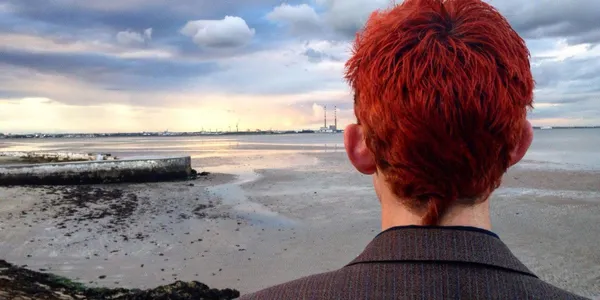Eye For Film >> Movies >> Handsome Devil (2016) Film Review
Handsome Devil
Reviewed by: Luke Shaw

The loner is a central figure in cinema, eminently relatable, endlessly versatile as a lynchpin for drama. Our loner in Handsome Devil is Fionn O’shea’s scarlet haired Ned Roche, punk in aesthetic only (although he does own a guitar he can only play one chord on), abandoned to a boarding school by upwardly mobile parents, ripe for bullying. Couple this with his homosexuality, a disregard for the social pecking order, and his dislike of rugby, the sport that his boarding school harbours an almost pathological love for, and we’ve got ourselves a modern day Stephen Daedalus.
Handsome Devil is Irish Director John Butler’s second feature, a stylish and heartwarming tale of triumph against adversity that is somewhat undermined by its predictable story and lack of guts in its final third. As the only pupil interested in the arts, Ned baulks at the prospect of sharing his room with newcomer Conor, played with a brooding intensity by the chiseled Nicholas Galitzine, a rugby star who has transferred schools after a bout of fighting.

Whilst Conor fits right in with his Rugby obsessed school mates, earning the respect of preening bully Weasel (Ruairi O’Connor) and the school's bullish coach, Pascal (Moe Dunford), Ned is not so lucky. He is constantly bullied, and finds his only reprieve in hoodwinking the aging English teacher by copying song lyrics verbatim and getting perfect grades back as a result. This all ends when new English teacher Dan Sherry strolls in with the Dead Poets Society playbook, telling them that “there’s no limit to what you can achieve by reading”. As Ned is punished for misguidedly trying to get another lyrical essay past his new hip teacher, he enters the lowest ebb of his life as a student.
The not so subtle setup here is graciously delivered on, with the kind of saccharine sweetness that befits this kind of mild comedy. The newcomers have secrets that are set to collide with Ned’s sense of alienation in a heartwarming denouement, and collide they do, though not without at least one interesting subversion. The film is cheery, never to the point of fault, but it lacks the condemnation of these institutions that enable such misery found in films like Another Country. This isn’t to say it’s bad, but when it comes tantalisingly close to exposing some of the poor attitudes expressed by faculty who should know better, it shies away from excoriating its subject in favour of weak redemption later on.
A film grappling with the difficulties of being gay at such a school can run the risk of having a message that conveniently ignores reality in favour of an uplifting ending. Luckily Andrew Scott’s performance, whilst heavily indebted to Robin Williams’ John Keating, is modern and nimble, avoiding stereotypical character traits and buoyed by Scott’s sardonic appeal. When he lashes at his superior with a cry of “maybe some boys don’t like fucking rugby?” it it comes from a very real place, and the film is at its best when it sticks closest to this message of realistic hope.
Sadly that gets a little bit obscured by the overly jovial feel of the film, which lets its homophobic characters get off a little bit too easily, and fails to really tackle the system of poor education that enables it. Even so, it’s hard to not to buy into the central character's struggles, and when Sherry earnestly tells a student that “It gets better, trust me. I can’t say when, but it gets better,” there’s a sense that film this comes from a very earnest and articulate place.
Reviewed on: 15 Feb 2017
















